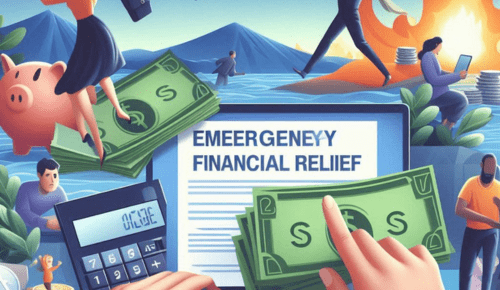How to Qualify for Emergency Financial Relief: A Step-by-Step Guide

Life can change in an instant, leaving many families facing tough money problems. When bills pile up, and savings run low, knowing how to get emergency financial relief becomes very important. This guide walks you through the process of finding and qualifying for financial assistance during hard times.
Understanding Financial Aid Options
The first step in getting quick financial assistance is learning about all your choices. The US government runs many programs at federal, state, and local levels to help people in need. Each state has its own social services department that manages these programs. Beyond government help, many non-profit groups and religious organisations provide support to people facing money problems.
Most government programs focus on specific needs. Housing programs help with rent or mortgage payments. Food assistance programs make sure families can eat healthy meals. Medical programs help pay doctor bills. Utility assistance keeps the lights on and the water running. Some programs even help with job training or childcare costs.
Local charities often fill gaps that government programs miss. They might help with car repairs, work clothes, or school supplies. Many can provide help faster than government programs, especially in emergencies. Credit unions sometimes offer special loans for people who need emergency cash relief.
Meeting Qualification Requirements
Getting emergency monetary aid means showing you truly need help. Most programs look closely at your income and expenses. They want to help people who need it most, so they have strict rules about who qualifies.
Your income usually needs to be at or below certain amounts based on the Federal Poverty Level. For example, a family of four might need to earn less than $30,000 per year to qualify for some programs. But each program uses different numbers, and some look at your expenses, too.
You’ll need documents to prove your situation. Recent pay stubs show how much you earn. Bank statements prove your account balances. Rent receipts or mortgage statements show housing costs. Utility bills prove what you pay for basic services. Your ID and Social Security card prove who you are and that you can legally get help.
Some programs also want to know about your assets. They might ask about your car, home, or savings accounts. Having too many assets could mean you don’t qualify for some types of financial crisis help. But don’t let this stop you from applying – many programs understand that owning a car or home doesn’t mean you don’t need help.
Application Process Made Simple
Applying for emergency monetary aid takes time and patience. Start by making copies of all your important papers. Many programs let you apply online now, but some still want paper applications. Either way, having your documents ready makes the process much faster.
When filling out applications, answer every question honestly and completely. Missing information can slow down your application. If you’re not sure about something, ask for help. Most programs have people who can explain confusing parts.
Keep good records of everything you submit. Write down when you applied and who you talked to. If you apply online, save or print confirmation pages. These records help if there are problems with your application later.
Follow up regularly on your applications. Many programs have waiting lists or take time to process requests. Calling once a week shows you’re serious about getting help and lets you know if they need more information from you.
After You Get Approved
Once you qualify for urgent financial support, use the help wisely. Most programs give help for a limited time, so planning matters. Create a budget that shows how you’ll spend any money or resources you receive.
Start with your most important needs first. Housing costs usually come first because having a safe place to live matters most. Then, focus on utilities, food, and medical care. If you get help with one bill, use your own money for other important needs.
Stay in touch with your caseworker or the program staff. They often know about other resources that might help you. They can also warn you if your benefits might end soon or if you need to reapply.
Look for ways to improve your situation while getting help. Many programs offer free classes about money management, job skills, or education. Taking these classes can help you need less help in the future.
Conclusion
Getting emergency financial relief means taking action and staying organised. The process takes work, but help is available if you qualify. Start by gathering your documents and researching programs in your area. Remember that many people need help sometimes – there’s no shame in asking for immediate financial assistance when you need it.
Ready to take the first step? Visit the Hardship Relief website today to learn what help you might qualify for. The sooner you start, the sooner you can get the help you need.
Frequently Asked Questions
Q: How fast can I get emergency financial relief?
A: Most programs take 5-10 business days to process applications. Some emergency programs might help within 24-48 hours if you face eviction or utility shutoff.
Q: What if I make too much money for government aid?
A: Look into non-profit organisations and local charities. They often have more flexible income limits and can help people who don’t qualify for government programs.
Q: Can I get urgent money help if I have bad credit?
A: Most emergency assistance programs don’t check credit scores. They focus on your current income and needs instead of past credit history.
Q: Do I have to pay back emergency financial relief?
A: Most government assistance and charity programs provide grants you don’t repay. Some programs offer low-interest loans that you would need to pay back.
Q: What if I need help with both rent and utilities?
A: Many programs can help with multiple needs. If one program can’t help with everything, they usually know other programs that can help with different bills.
